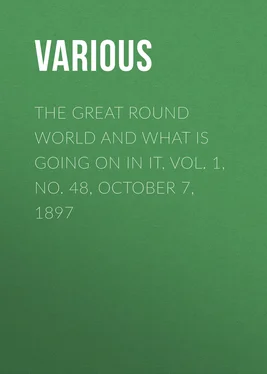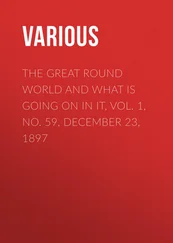Various - The Great Round World and What Is Going On In It, Vol. 1, No. 48, October 7, 1897
Здесь есть возможность читать онлайн «Various - The Great Round World and What Is Going On In It, Vol. 1, No. 48, October 7, 1897» — ознакомительный отрывок электронной книги совершенно бесплатно, а после прочтения отрывка купить полную версию. В некоторых случаях можно слушать аудио, скачать через торрент в формате fb2 и присутствует краткое содержание. Жанр: foreign_children, periodic, foreign_antique, foreign_prose, на английском языке. Описание произведения, (предисловие) а так же отзывы посетителей доступны на портале библиотеки ЛибКат.
- Название:The Great Round World and What Is Going On In It, Vol. 1, No. 48, October 7, 1897
- Автор:
- Жанр:
- Год:неизвестен
- ISBN:нет данных
- Рейтинг книги:5 / 5. Голосов: 1
-
Избранное:Добавить в избранное
- Отзывы:
-
Ваша оценка:
- 100
- 1
- 2
- 3
- 4
- 5
The Great Round World and What Is Going On In It, Vol. 1, No. 48, October 7, 1897: краткое содержание, описание и аннотация
Предлагаем к чтению аннотацию, описание, краткое содержание или предисловие (зависит от того, что написал сам автор книги «The Great Round World and What Is Going On In It, Vol. 1, No. 48, October 7, 1897»). Если вы не нашли необходимую информацию о книге — напишите в комментариях, мы постараемся отыскать её.
The Great Round World and What Is Going On In It, Vol. 1, No. 48, October 7, 1897 — читать онлайн ознакомительный отрывок
Ниже представлен текст книги, разбитый по страницам. Система сохранения места последней прочитанной страницы, позволяет с удобством читать онлайн бесплатно книгу «The Great Round World and What Is Going On In It, Vol. 1, No. 48, October 7, 1897», без необходимости каждый раз заново искать на чём Вы остановились. Поставьте закладку, и сможете в любой момент перейти на страницу, на которой закончили чтение.
Интервал:
Закладка:
Various
The Great Round World and What Is Going On In It, Vol. 1, No. 48, October 7, 1897 / A Weekly Magazine for Boys and Girls
The peace negotiations are settled; that is to say, the plans suggested by Lord Salisbury, and agreed to by the Powers, have also been accepted by the Sultan.
On the 18th of September, after a conference of three hours, the ambassadors and Tewfik Pasha signed their names to the treaty. As soon as this was done, Tewfik carried the document to the palace and obtained the Sultan's signature also.
According to the terms of the treaty, the troops are to be withdrawn from Thessaly within one month after it goes into effect, and the Powers are to control the income of Greece until the war indemnity of fifteen million dollars shall be paid.
Nothing now remains but for Greece to agree and for King George to sign his name beside that of the Sultan.
Though every one must feel glad that peace has been made between these two warring nations, yet the terms are so hard for Greece that if she signs the treaty she will practically be signing away her independence as a nation.
There is a very shameful story behind the Greco-Turkish war. In the histories that will be written about it, it will be recorded that Greece was sacrificed by Europe for the sake of Turkish gold.
We have told you before of the money difficulties in Turkey, and that the Sultan has been called the "Sick Man of Europe" because of the unfortunate condition of his affairs, which were in such a deplorable state that it seemed as though the kingdom of Turkey must soon be swallowed up by the more powerful nations of Europe.
The Turkish nation has been on the verge of bankruptcy for many years. To help the struggling Government along loans of money have been made at different times, and all that was of value in the country pledged as security for the repayment of the loans. Bonds were issued on these securities, but owing to the impoverished condition of the country they were of very little value, and at one time the Turkish bonds were the joke of the stock market. Still, the bonds existed, and their holders hoped at some time to get their money back.
Few governments are wealthy enough to support themselves without borrowing money. In Europe most loans are arranged by the wealthy bankers, who demand security in return. We explained this matter to you in speaking of the quicksilver mines and the Rothschilds, on page 1023.
Transactions of a similar character to that of the quicksilver mines have been entered into by almost all of the European countries, and the consequence is that there is hardly a foreign nation that is not under obligations to its moneyed men, or financiers, as they are called.
The power of the financiers has become so great that they are now able to dictate the policy of Europe. Behind the will of kings and emperors is the will of these financiers. If the moneyed men refuse to lend their gold to a country, they may prevent its going to war, the erection of fine buildings, or the doing of many things that are necessary to keep up its proper position as a nation.
When Greece, enraged that her Christian brothers should be under the thraldom of the heathen Turk, went to the rescue of Crete, all the brave men of Europe applauded the gallant little country for her pluck. But the brave men of Europe did not represent the money of Europe. The financiers who were at the back of the various Powers distinctly disapproved of the war. If Greece succeeded in whipping the Turks all the money invested in Turkey might be lost.
In was well understood that Greece could not succeed in the struggle with Turkey unless some of the Powers came to her aid, and so the financiers warned the statesmen that Greece must not be helped; and because of the power of the financiers, and for the sake of the money involved, Greece was sacrificed, and Turkey permitted to be the victor.
The whole situation was thoroughly understood by the Sultan, who laughed in his sleeve at the dilemma the Powers were in; and knowing that he was perfectly safe, and that they dare not declare war against him, he delayed the peace negotiations for months, and settled his army in Thessaly, to destroy the prosperity of the country.
The position of Greece is now something deplorable. When she has given her consent to the terms of the treaty she will no longer be a free and independent nation, but a slave to the countries that control her treasury. While she still has her King seated on the throne, his power is no longer what it was. He can carry out no great schemes for his country's good, for he can enter into no plans, that involve the spending of money, without the consent of the Powers that are to manage his affairs.
The plan that the Powers should control the treasury of Greece was not agreed upon until Germany, prompted by the financiers, insisted that Greece must lay money by to take care of her old debts, as well as of the new war payment.
This is the story of the Greco-Turkish war. The great Powers stood quietly by and let Greece be sacrificed, and then insisted upon a shameful treaty, that will bring ruin and distress to a sister country, because the financiers were unwilling to lose money they had invested.
The Powers are, however, by no means satisfied with the result of their fifteen weeks of deliberation and discussion. They feel that the Sultan has got much the best of them at every point, and even though he has agreed to do so, they are uncertain whether he intends to keep faith with them about either Crete or Thessaly.
It is said that as soon as the first five million dollars is paid he will invent some fresh excuse for keeping his soldiers in Thessaly a little longer, and that he will lengthen the time little by little, until, in the end, he will retain possession of Thessaly altogether.
He has already hinted that he does not mean to keep faith about Crete.
He told the Italian ambassador the other day that in return for the good terms he had made with Greece he expected the Powers to be very lenient in regard to Crete.
The ambassador, much surprised at this remark, ventured to remind the Sultan that Home Rule for Crete had already been agreed on.
The crafty Sultan smiled and shrugged his shoulders, and intimated to the ambassador that the settlement of affairs in Crete was not quite so sure as he seemed to think.
The conclusion of the peace has left every one weary and annoyed. The Powers evidently feel ashamed of the part they have taken in the affair, and are seeking to find an excuse for their own wrongdoings by blaming their representatives. It is therefore rumored that all the ambassadors at Constantinople are to be changed, because the Powers feel that they have been outwitted by the Sultan, and can no longer have any influence with him.
It must not be supposed that the Greeks are taking the matter quietly.
A feeling of intense indignation prevails throughout Greece. Mass-meetings have been held protesting against the treaty, bonfires have been built at which the people have eased their feelings by burning copies of the hated peace document. It is even thought that the Greek Congress, the Boulé, may refuse to accept the treaty as it stands.
Some of the Greeks declare that the signing of the treaty will mean that Greece will cease to be a nation and become nothing more than a name.
Were Greece a little stronger than she is, it is certain that she would reject the terms of peace, and continue the war with Turkey, but unfortunately she is in such a feeble condition that it looks as if she would have to do just as the Powers dictate.
In spite of the anger and indignation of her people, Greece has very little choice but to accept the treaty as it stands.
Some excitement was caused last week by the rumor that General Woodford had informed the Spanish minister of foreign affairs that unless the war with Cuba was brought to a close in October, the United States would interfere.
Читать дальшеИнтервал:
Закладка:
Похожие книги на «The Great Round World and What Is Going On In It, Vol. 1, No. 48, October 7, 1897»
Представляем Вашему вниманию похожие книги на «The Great Round World and What Is Going On In It, Vol. 1, No. 48, October 7, 1897» списком для выбора. Мы отобрали схожую по названию и смыслу литературу в надежде предоставить читателям больше вариантов отыскать новые, интересные, ещё непрочитанные произведения.
Обсуждение, отзывы о книге «The Great Round World and What Is Going On In It, Vol. 1, No. 48, October 7, 1897» и просто собственные мнения читателей. Оставьте ваши комментарии, напишите, что Вы думаете о произведении, его смысле или главных героях. Укажите что конкретно понравилось, а что нет, и почему Вы так считаете.












